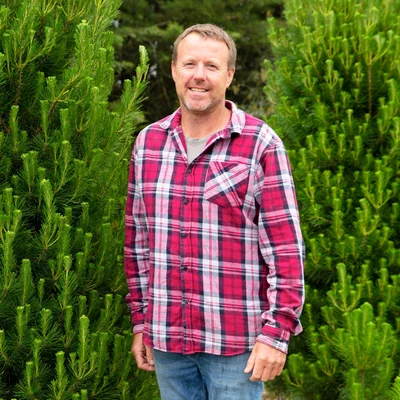A festive farm

While most farmers are growers of food and fibre, Andrew McAllister grows festive spirit by the acre in the form of around 20,000 perfectly shaped and bushy Christmas trees on his farm near Ohoka, North Canterbury.
His farm, Needle Fresh Christmas Trees, has become part of the Christmas tradition for countless Christchurch families since it began in around 2005.
"There are some customers who have been buying trees off me for fifteen years," McAllister says.
McAllister, raised on a sheep farm near Oxford, learned how to grow trees after working on a Christmas tree farm in Scotland while on an overseas trip when he was 18.
That led to a six-year stint working seasonally on a tree farm in Denmark before making the journey home.
Once back, McAllister spent some time considering his business and career options.
"I'd spent so much time over there and was so happy, then I came back here and didn't know where to start.
"Christmas trees were always on the cards, but that was going to take some time."
McAllister says his farming background helped prepare him for growing trees.
"It's just that knowledge of soil preparation for planting and all that.
"It's still farming."
McAllister bought a smaller block of land on Tram Road to put into trees but quickly "outgrew' the property.
The current 50-acre property came on the market, and once issues were ironed out with water, McAllister bought the farm in 2016 and has never looked back.
McAllister has renovated the house on the farm, where he lives with his two sons, Luca and Alex, and has spent the last seven years developing the property and growing the business.
"We've got maybe seven or eight hectares in trees.
"We got our first crop in the ground in Autumn, and then every year we keep planting, and every year we sell.
"It's a rotational crop.”
The remainder of the property is utilised for grazing lambs, and selling standing grass.
The trees are mainly Monterey Pine (Pinus Radiata) with some Douglas fir, which are the stereotypical trees seen in hallmark movies but can be tricky to maintain in the New Zealand climate.
McAllister initially grew seedlings on-farm but now purchases them from the local Rangiora Nursery.
McAlister said demand for seedlings can be high, with people planting pines for carbon farming.
Trees are carefully trimmed during the year to give them the full shape people want in the perfect tree.
"We clean the needles off the bottom of the seedling when they get to a certain height so they sit in the stand, and they have a big ball of branches coming out at ground level."
The trees, which take around four years to go from seedling to yule-tide ready, are sold at two locations in Christchurch and on-site where customers can 'pick their own'.
This year, McAllister is also trailing a small crop of Christmas Lilies.
"We won't sell them in town; we'll just have them here for sale in buckets."
McAllister said the biggest challenge for the business has been to get the volume of trees out the gate, with plastic trees still being a preferred consumer choice in most instances.
"Some people think they are doing the right thing by buying a plastic tree because they aren't killing a real tree, but there is nothing environmentally sustainable about a plastic tree.
"It's absolute nonsense; our trees are super environmentally friendly because it's a rotational crop; you literally plant a new seedling next to the stump."
Christmas in the McAllister household is surprisingly low-key.
"We could easily get away without having a tree.
"It's great when the season starts, but is like anything- it's also good when it ends.
"It's a busy five weeks, and you're pretty burnt out by the end of it."
Keeping your Christmas tree looking it's best:
- If buying a cut tree, trim an extra inch off the bottom when you get it home.
- Don't keep a cut tree in sand or soil - instead, keep it in water.
- In the first few days, your tree will drink a lot of water before slowing down. Trees must have enough water in those first few days, or the tree will struggle to come back – so keep topping the water up.
- Purchase a good quality tree stand. McAllister recommends the New Zealand-made Cono stands.
By Claire Inkson

